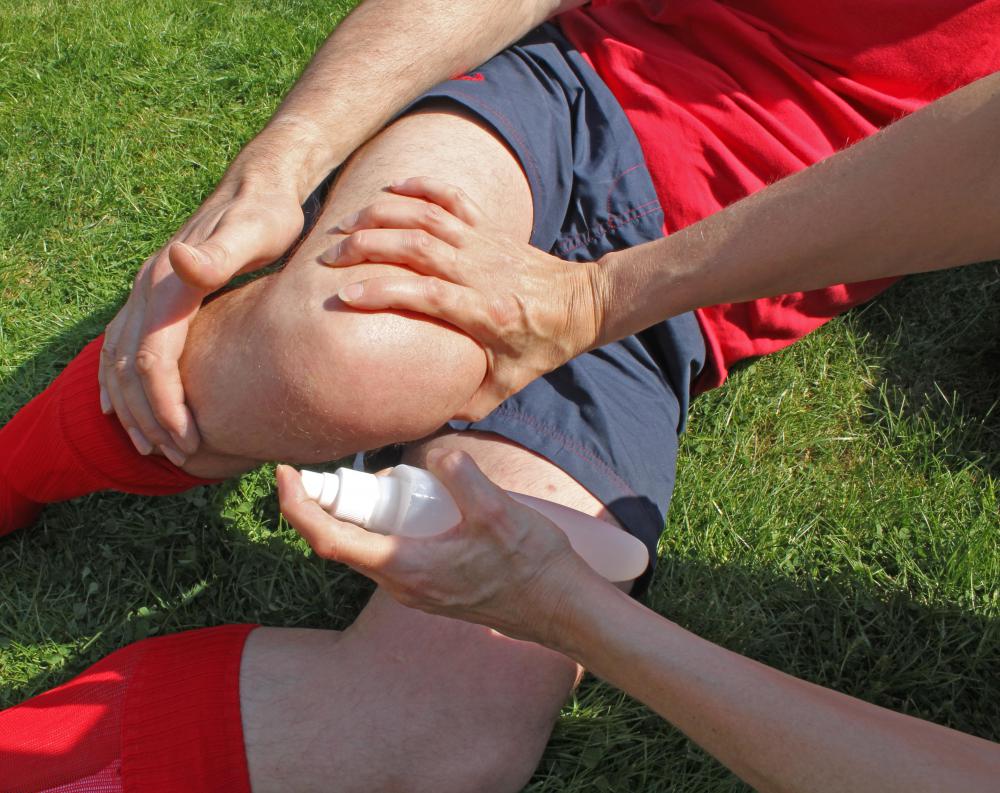At TheHealthBoard, we're committed to delivering accurate, trustworthy information. Our expert-authored content is rigorously fact-checked and sourced from credible authorities. Discover how we uphold the highest standards in providing you with reliable knowledge.
What Is Anesthetic Spray?
An anesthetic spray offers fast-acting topical anesthesia for medical and cosmetic procedures that might cause discomfort. It absorbs into the skin to block nerve impulses, ensuring that pain signals don’t travel out from the site. After around 30 to 60 minutes, the body usually completely metabolizes the spray, allowing sensation to return. If necessary, multiple applications can be used to maintain a numb state for a longer procedure. Some anesthetic sprays are available over the counter, while others may require a prescription.
Lidocaine and benzocaine are common ingredients in such products because they act quickly. The spray can be provided in a canister with a changeable head that can be switched between patients to ensure sterility in an environment like a hospital where there are concerns about spreading disease. For home use, the applicator may be left in place. Some products are also available as foams or gels that can be sprayed or rubbed into the skin to provide numbing.

In medical settings, anesthetic spray can be used to quickly numb a site before a procedure. Some products are safe for the mucous membranes, which makes them useful for procedures like intubations, where patients might feel uncomfortable. To reduce the risk of gagging and fighting the tube, a medical provider can apply anesthetic spray, wait a few seconds, and then start the procedure. Sprays can also be used for quick sutures, minor medical implants, and similar activities.

Dentists can also use an anesthetic spray for oral procedures. Deeper local anesthesia with an injection may be necessary for some, but for others, a spray may be sufficient. The best choice depends on the patient and the type of dental procedure. For something like an extraction, a spray usually doesn’t penetrate enough to provide comfort for the patient, while it might be appropriate for a tooth cleaning where the dentist anticipates some pain around the gum line.

At home, people may use an anesthetic spray as a home treatment for sunburn, or to numb the skin before removing hair. Sometimes salons offer numbing spray before procedures like waxing, which can be very uncomfortable. These are typically not as strong as those used in hospitals and medical offices, and the client may notice some irritation and pulling during the treatment. Some clinical trials have also been conducted with numbing sprays for treatment of premature ejaculation, using the spray to reduce sensation to allow men to maintain erections longer.
AS FEATURED ON:
AS FEATURED ON:















Discussion Comments
I use a lidocaine anesthetic spray with aloe vera when I get burns. I think this is the best product out there for sunburns or otherwise. The pain is completely gone in just a few minutes.
@ankara-- My tattoo artist used numbing spray for me because I have low tolerance for pain and I specifically requested it. I still felt the needle a little bit, bit it certainly wasn't something I couldn't handle. So I'd say it works well.
Some tattoo artists are against using numbing sprays and creams because they think it will affect the quality of the tattoo. Some people also prefer to feel the pain during the process. So if you want the artists to use anesthetic spray, definitely talk about this before you commit to working with that artist.
I think anesthetic sprays are also used by tattoo artists to reduce pain while tattooing. I'm thinking about getting a tattoo but I'm scared that it will be very painful.
Has anyone gotten a tattoo with anesthetic spray? Does the spray work? Did you feel anything?
Post your comments